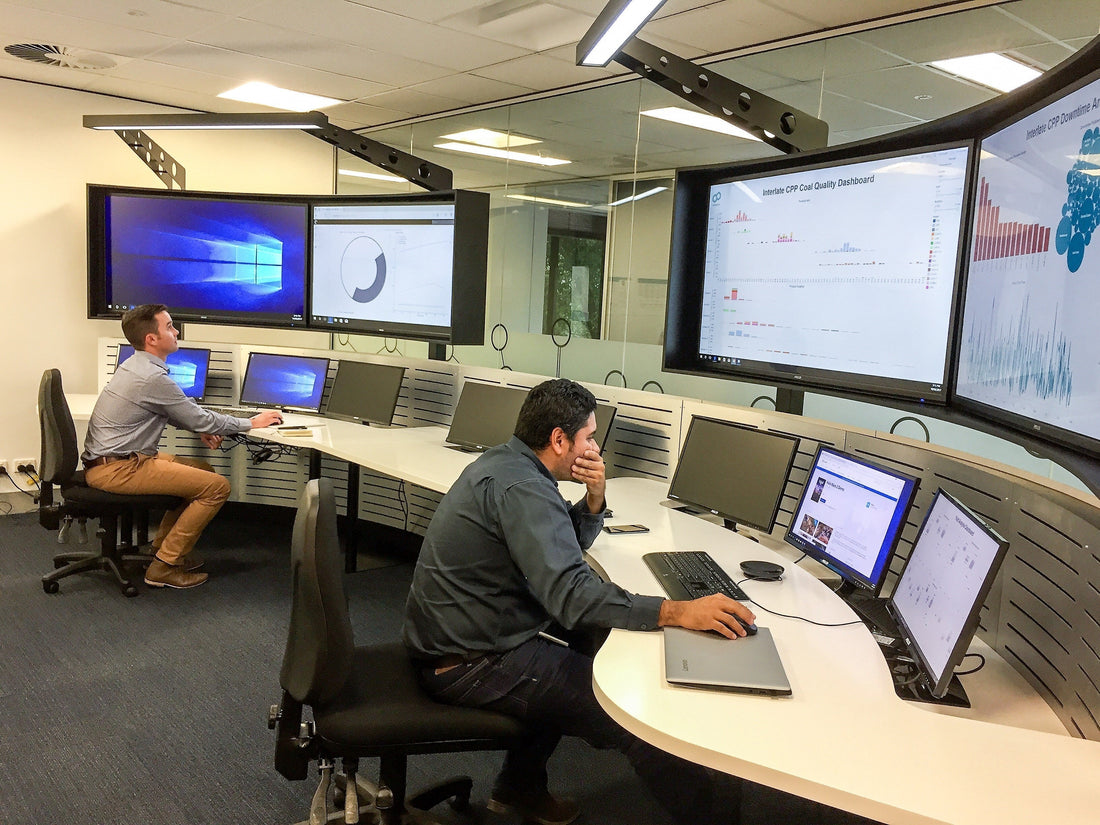
What is an Intelligence Centre?
What is an Intelligence Centre?
In today’s fast-paced industrial environments, real-time data and advanced analytics are critical for making informed decisions that drive efficiency, productivity, and profitability. An Intelligence Centre is a central hub that integrates operational data, analytics, and expertise to enable proactive decision-making and continuous improvement. It provides a structured approach to managing complex industrial operations by consolidating data streams, optimising planning, and ensuring that all key stakeholders have access to actionable insights.
The role of an Intelligence Centre
An Intelligence Centre serves as the nerve centre of an operation, bringing together mine planners, process engineers, data scientists, and operational teams. By leveraging real-time data, advanced analytics, and artificial intelligence, the Intelligence Centre enables:
- Optimised Planning: Ensuring that operational plans align with business strategy and target maximum value.
- Dynamic Decision-Making: Adjusting operational set points in real-time to drive peak performance.
- Short Interval Control: Identifying and responding to losses or inefficiencies within each shift.
- Predictive Maintenance & Asset Management: Reducing unplanned downtime by forecasting equipment failures before they occur.
- Business Improvement Integration: Continuously identifying and implementing process enhancements based on data-driven insights.
The role of the Management Operating System (MOS)
The Intelligence Centre is deeply integrated into daily operations through a Management Operating System (MOS), which acts as the bridge between the centre and the broader operational environment. The MOS ensures that real-time data and analytics drive practical, actionable decisions within the standard flow of operations.
Done well, this integration minimises the overall size of the management function across the organization, allowing companies to optimise resource allocation. It enables access to a broad range of talent—both dedicated and part-time—supporting operational tasks efficiently while keeping on-site staffing lean. By embedding the Intelligence Centre within the MOS framework, businesses can ensure seamless coordination, streamlined workflows, and a highly responsive approach to decision-making.
Why Intelligence Centres matter
Modern industrial operations generate vast amounts of data, but without a centralised approach, much of this information remains underutilised. Intelligence Centres address this challenge by:
- Integrating Data Across the Value Chain: Connecting operational technology (OT) with enterprise systems to provide a holistic view of performance.
- Enabling Real-Time Insights: Using data visualisation, machine learning, and predictive analytics to anticipate challenges and opportunities.
- Driving Cost Reduction & Efficiency Gains: Through better planning, loss identification, and process optimisation.
- Improving Safety & Compliance: Monitoring key operational and environmental parameters to ensure adherence to regulatory and safety standards.
What’s next? A deeper dive
This blog serves as an introduction to the concept of an Intelligence Centre, but there’s much more to explore. In the coming series, we’ll delve deeper into key elements that make an Intelligence Centre effective, including:
- The Management Operating System & Operational Integration – How the MOS connects the Intelligence Centre to core operations, minimising overhead while maximising efficiency.
- Real-Time Data Integration – How Intelligence Centres consolidate and analyse data from multiple sources.
- Advanced Analytics & AI – The role of machine learning and AI in optimising decision-making.
- Operational Planning & Short Interval Control – The importance of aligning daily operations with business objectives.
- Predictive Maintenance & Asset Lifecycle Management – Leveraging analytics to maximise equipment uptime.
- Business Improvement & Continuous Optimisation – How Intelligence Centres identify and drive efficiency gains.
- Scalability & Implementation – Best practices for deploying an Intelligence Centre that evolves with operational needs.
By following this series, you’ll gain a comprehensive understanding of how Intelligence Centres can transform industrial operations, enhance decision-making, and drive sustainable business improvements.
Stay tuned for the next article, where we explore The Management Operating System & Operational Integration.
